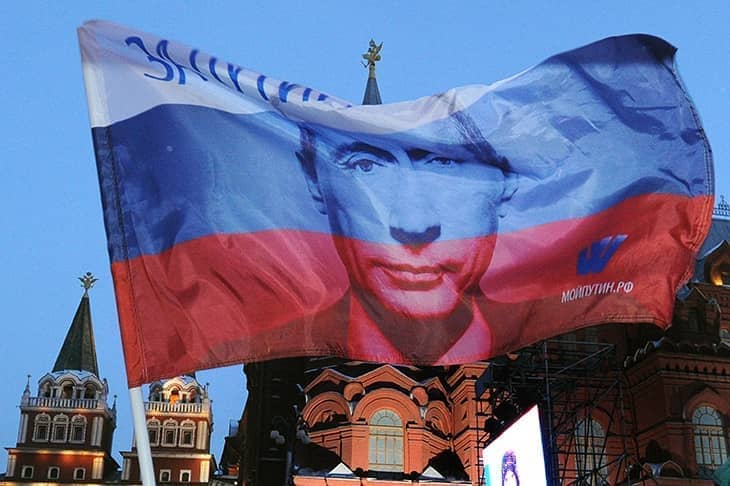Two Russias?
Sir: I have been turning Owen Matthews’s article (‘Putin’s rage’, 5 March) over in my mind since I read it, and I feel compelled to respond. I am married to a Ukrainian, so I have some insight into the relevant history.
After the Wall came down, my wife’s uncle Stephan visited us in England. He had spent 20 years in a Soviet gulag because his brother – my father-in-law – had fought against the Russians for a free Ukraine in the 1940s, during what they still call the Great Patriotic War. Unable to imprison him, they took his brother instead.
Recalling the perpetual struggle waged by Ukraine against its habitually abusive neighbour, I struggle with Mr Matthews’s reference to a Russia that is bigger, stronger and more durable than Putin, and am unable to decide whether it is a threat or a promise.
Your readers may like to read a translation of the Ukrainian national anthem. It was written by the Ukrainian poet Pavlo Chubinsky in 1863.
The glory and freedom of Ukraine has not yet perished Fate will at last smile upon the Ukrainian people. Our enemies will fade and die, like the dew is burned away in the sunshine, Our people will finally live happy and free in our own land. Until then we shall spare neither our souls nor our bodies to gain our freedom And prove our people worthy to be true Cossacks.
The enemy referenced here is, and always was, Russia. It is not Putin’s Russia.
Sean Reynolds
By email
Cossack mission
Sir: Andrew Roberts suggests that the assassination of Putin could be the most desirable outcome of the present crisis – desirable for Russia as much as for Ukraine (Diary, 12 March). At the conclusion of my recent book Stalin’s Vengeance, I describe from now-closed Russian archival material the mission assigned a tough and resourceful Cossack, Captain Kantimir. He headed a small elite group of his fellow Cossacks, who were trained by the German army to be dropped by parachute well behind Soviet lines in order to conduct sabotage operations. By 1945 actions on so small a scale were no longer of any military value, and it appears that Kantimir’s ‘Ataman Group’ was entrusted with a desperate mission to eliminate Stalin himself. In May 1945 the group surrendered, along with the main body of Cossacks, to the British 5 Corps in Austria. There they proffered their services in what they believed to be the coming war between the western Allies and the Soviet Union. Their reward was to be separated from the other Cossacks and secretly handed over to Smersh in the Soviet zone of Austria – this despite the fact that Kantimir was a White Russian émigré whose repatriation was forbidden under Allied orders.
When my book was published at the end of last year, I sent a copy to the Russian ambassador in London. In the past I have been welcomed at the embassy, but on this occasion for the first time I did not receive the courtesy of a reply. Now I understand why.
Nikolai Tolstoy
Southmoor, Berkshire
We need the North Sea
Sir: Martin Vander Weyer (Any other business, 12 March) quotes the telling statistic that liquefied natural gas (LNG) imported from Qatar has a carbon footprint nearly three times greater than home-produced North Sea gas. The source of that analysis is a research paper published by the Oil and Gas Authority in May 2020. This is because LNG must be liquefied, transported, then re-vaporised: all carbon-emitting operations. Producing more gas in the UKCS will, given demand remains similar for the foreseeable future, reduce overall emissions considerably by cutting reliance on LNG imports. Conversely, failing to do so will require even more LNG imports and make our carbon footprint a giant size 13.
What is also true is that Carbon Capture and Storage (CCS) is an essential means of reaching UK climate targets. Transportation and then storage of carbon in depleted oil and gas fields can only be done by the oil and gas industry, as their skills in areas such as seismology drilling and reservoir management are needed. Moreover, platform electrification using offshore wind to power oil and gas installations will further reduce emissions of oil and gas produced in the North Sea. I hope the UK government will now ensure the financing of the Acorn project to be delivered in Scotland. One mature industry – oil and gas – can, provided we support them, give birth to two new ones: CCS and platform electrification. An integrated energy industry in the UK is a win-win for the economy and the environment.
The truth, though counter-intuitive and perhaps inconvenient for some, is that a thriving oil and gas industry in the UK is essential to deliver climate change targets. I hope the government in Scotland, of which until last May I was part, takes heed.
Fergus Ewing
MSP, Inverness and Nairn; former Energy Minister, Scottish government 2011-2016
Prickly problem
Sir: As an observer of hedgehogs for many decades, I can assure Tom Holland (Notes on hedgehogs, 5 March) that their recent precipitous decline has coincided exactly with the legislation to protect badgers.
As the only animal able to uncurl a hedgehog and consume it, a badger with its leather paws is always going to predate upon its small prey and possibly drive it to extinction. This is shown in the better hedgehog numbers in towns and cities, where badgers have not yet established themselves. Their numbers have, however, exploded in the countryside. Protection of one animal will often mean unacceptable losses in prey animals. In a small woodland, I have watched what was a significant hedgehog population dwindle away as the area became home to multiple badger setts. Beware the law of unintended consequences when bringing in animal protection legislation…
Bronwen Naish
Moelfre, Gwynedd






Comments